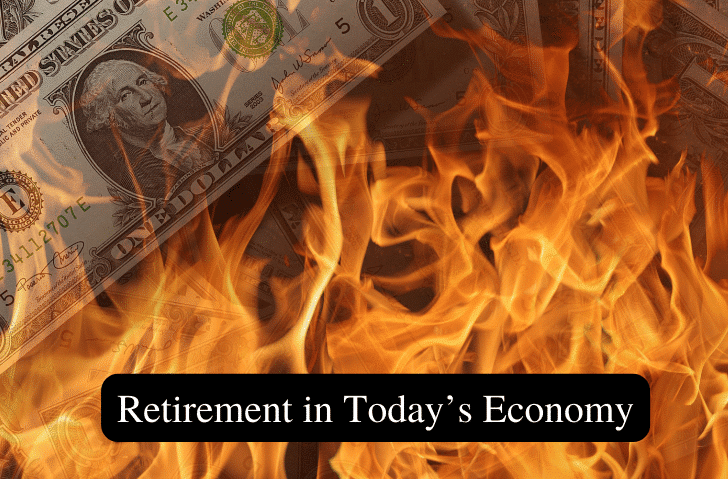In just four years, the financial landscape for retirees has shifted dramatically, placing many in precarious situations. While retirement was once a time to enjoy the fruits of decades of labor, today’s retirees are finding themselves navigating a sea of economic challenges that threaten their financial stability. The rising cost of living, the inflated costs of maintaining home equity, and the volatile stock market are all contributing factors. These challenges make it clear that retirees are worse off today than they were just a few years ago.
Inflation and the Rising Cost of Living
One of the most significant factors contributing to the financial strain on retirees is the combination of inflation and the skyrocketing cost of essential goods and services. Over the past four years, inflation has eroded the purchasing power of retirees’ fixed incomes. Items like gas, food, and insurance have seen price increases at a meteoric pace, far outstripping the modest cost-of-living adjustments that Social Security (or even your retirement income plan) provides.
For retirees who are no longer earning an income, these rising costs can be devastating. Many find themselves dipping into their savings at a faster rate than anticipated, leading to concerns about outliving their resources. This financial squeeze is exacerbated by the fact that many retirees are on fixed incomes, which do not rise with inflation, leaving them with fewer options to cope with the increasing costs.
Home Equity: A Double-Edged Sword
Another challenge facing today’s retirees is the high cost of maintaining home equity. Many retirees have significant equity in their homes, a result of years of mortgage payments and the recent surge in real estate prices. However, this equity comes with a steep price. The costs associated with property taxes, maintenance, and utilities have all increased substantially, making it increasingly difficult for retirees to afford to stay in their homes.
While downsizing might seem like a logical solution, the reality is more complicated. The price of real estate has exploded to such an extent that finding a smaller, more affordable home in a desirable area is often impossible without making extreme changes to one’s lifestyle. For many retirees, selling their home to unlock equity only to face similar or even higher housing costs elsewhere is not a viable option. This situation leaves retirees feeling trapped in homes that are becoming increasingly unaffordable to maintain.
Stock Market Volatility
The stock market, traditionally a key component of retirement portfolios, has also presented challenges in recent years. While the market has performed well overall, it has not done so without significant swings. These fluctuations can be particularly troubling for retirees who rely on their investments to generate income. The volatility creates uncertainty, and for those who are withdrawing funds during a downturn, the impact on their overall retirement savings can be severe.
Retirees who entered the market during a high point may find themselves facing a reduced portfolio value after a market correction. This not only affects their current financial situation but also raises concerns about the long-term sustainability of their retirement funds. The uncertainty of the stock market adds another layer of complexity to the financial planning that retirees must undertake.
Solutions for Protecting Retirement Security
Given these challenges, it is crucial for both current and future retirees to take proactive steps to protect their financial security. Here are three solutions that can help retirees navigate these uncertain times:
- Diversify Income Sources: Retirees should consider diversifying their income sources beyond Social Security and investment withdrawals. This might include part-time work, rental income, or annuities that provide a steady stream of income. Diversification can help mitigate the risks associated with inflation and market volatility, providing a more stable financial foundation.
- Reevaluate Housing Options: While downsizing may not be feasible for everyone, retirees should explore alternative housing options that can reduce their overall expenses. This might include relocating to areas with lower property taxes, considering co-housing arrangements, or even leveraging reverse mortgages as a way to unlock home equity without selling the property.
- Adopt a Conservative Investment Strategy: Given the volatility of the stock market, retirees should work with a financial advisor to adopt a more conservative investment strategy that aligns with their risk tolerance and income needs. This might involve shifting a portion of their portfolio into more stable, income-generating assets, such as bonds or dividend-paying stocks, to protect against market downturns.
The financial challenges retirees face today—rising inflation, increased living costs, and the volatility of home equity and the stock market—have made retirement more difficult than just a few years ago. However, by diversifying income, exploring alternative housing options, and adopting conservative investment strategies, retirees can better safeguard their financial security and enjoy a more stable retirement. Planning and adaptability are essential to navigating these uncertain times.
Are you concerned about about being able to stay retired? Make sure to contact me and lets review.

